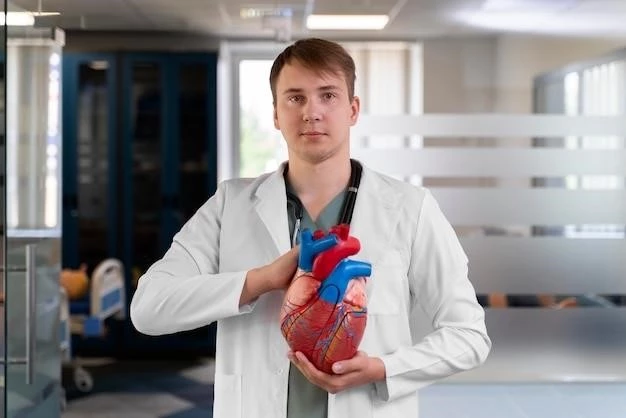Introduction to Arrhythmogenic Right Ventricular Cardiomyopathy (ARVC)
Arrhythmogenic Right Ventricular Cardiomyopathy (ARVC) is a rare genetic heart disorder that primarily affects the right ventricle․
Definition and Background
Arrhythmogenic Right Ventricular Cardiomyopathy (ARVC) is a hereditary heart condition characterized by the replacement of heart muscle with fibrous and fatty tissue․ This structural change can lead to abnormal heart rhythms and increase the risk of sudden cardiac death, particularly in young individuals․ Understanding the genetic basis and clinical manifestations of ARVC is crucial for early detection and management of the disease․
Causes of Arrhythmogenic Right Ventricular Cardiomyopathy
The primary causes of ARVC include genetic factors and environmental triggers that contribute to the development of the condition․
Genetic Factors
Genetic factors play a significant role in the development of Arrhythmogenic Right Ventricular Cardiomyopathy (ARVC)․ Mutations in genes encoding proteins in cardiac cell junctions are commonly associated with the disease․ These mutations disrupt cell-to-cell adhesion and communication, leading to fibrofatty replacement of heart muscle․ Understanding the genetic basis of ARVC is essential for risk assessment, diagnosis, and targeted treatment strategies․
Environmental Triggers
While genetic factors predominantly contribute to Arrhythmogenic Right Ventricular Cardiomyopathy (ARVC), environmental triggers can also influence the progression of the disease․ Factors such as physical exertion, emotional stress, and excessive alcohol consumption can exacerbate arrhythmias and increase the risk of cardiac complications in individuals with ARVC․ Avoiding these triggers and adopting a healthy lifestyle are important considerations in the management of the condition․
Symptoms and Diagnosis of ARVC
Recognizing the symptoms and diagnosing Arrhythmogenic Right Ventricular Cardiomyopathy (ARVC) involve careful evaluation and specialized tests․
Common Symptoms
Common symptoms of Arrhythmogenic Right Ventricular Cardiomyopathy (ARVC) include palpitations, dizziness, fainting, and chest pain․ Patients may also experience shortness of breath, especially during physical activity․ These symptoms can vary in severity and may indicate underlying heart rhythm disturbances that require further evaluation by a healthcare provider specialized in cardiac conditions․
Diagnostic Procedures
Diagnosing Arrhythmogenic Right Ventricular Cardiomyopathy (ARVC) typically involves a combination of tests such as electrocardiography (ECG), echocardiography, cardiac MRI, and genetic testing․ These diagnostic procedures help identify structural abnormalities in the heart, assess heart function, and detect genetic mutations associated with ARVC․ A comprehensive evaluation is essential for confirming the diagnosis and developing an effective treatment plan tailored to the individual patient’s needs․

Treatment Options for Arrhythmogenic Right Ventricular Cardiomyopathy
Treatment for Arrhythmogenic Right Ventricular Cardiomyopathy (ARVC) aims to manage symptoms and reduce the risk of sudden cardiac events․
Medications
Medications play a key role in managing Arrhythmogenic Right Ventricular Cardiomyopathy (ARVC)․ Antiarrhythmic drugs such as beta-blockers, sodium channel blockers, and amiodarone are commonly prescribed to control abnormal heart rhythms․ In addition, medications to treat heart failure and reduce the risk of blood clots may be recommended based on the individual’s symptoms and cardiac function․ Close monitoring and adjustment of medication regimens are essential to optimize treatment outcomes for patients with ARVC․
Implantable Cardioverter Defibrillator (ICD)
An Implantable Cardioverter Defibrillator (ICD) is a critical treatment option for patients with Arrhythmogenic Right Ventricular Cardiomyopathy (ARVC) at risk of life-threatening arrhythmias․ The device continuously monitors the heart’s rhythm and delivers a shock to restore normal heart function in the event of a dangerous arrhythmia․ ICD implantation can significantly reduce the risk of sudden cardiac death in individuals with ARVC and is often recommended in high-risk cases to enhance patient safety and improve long-term outcomes․
Catheter Ablation
Catheter ablation is a specialized procedure used in the treatment of Arrhythmogenic Right Ventricular Cardiomyopathy (ARVC) to manage recurrent, drug-resistant arrhythmias․ During the procedure, catheters are guided to the heart to deliver energy that destroys abnormal electrical pathways causing irregular heartbeats․ Catheter ablation can help restore normal heart rhythm and reduce the frequency of arrhythmia episodes in patients with ARVC․ Close follow-up care post-ablation is crucial to assess the effectiveness of the procedure and optimize long-term outcomes․
Genetic Testing for ARVC
Genetic testing plays a crucial role in identifying mutations associated with Arrhythmogenic Right Ventricular Cardiomyopathy (ARVC)․
Importance of Genetic Testing
Genetic testing is crucial in diagnosing Arrhythmogenic Right Ventricular Cardiomyopathy (ARVC) as it helps identify specific gene mutations that predispose individuals to the condition․ Understanding the genetic basis of ARVC enables healthcare providers to assess disease severity, predict potential complications, and offer personalized treatment strategies that target underlying genetic abnormalities․ Genetic testing also plays a role in family screening and risk stratification, allowing for early intervention and proactive management of ARVC․
Procedure and Implications
The procedure for genetic testing in Arrhythmogenic Right Ventricular Cardiomyopathy (ARVC) involves collecting a blood or saliva sample for analysis of specific genes associated with the condition․ Results from genetic testing have various implications, including confirming a diagnosis, guiding treatment decisions, assessing the risk of disease progression, and providing valuable information for family members at risk of inheriting the genetic mutation․ It is essential for healthcare providers to interpret test results accurately and communicate the implications effectively to patients and their families․
Lifestyle Management for Patients with ARVC
Adopting a healthy lifestyle is essential for managing Arrhythmogenic Right Ventricular Cardiomyopathy (ARVC) and improving overall well-being․
Exercise Recommendations
Exercise recommendations for patients with Arrhythmogenic Right Ventricular Cardiomyopathy (ARVC) should be individualized and supervised by a healthcare provider familiar with the condition․ Low to moderate-intensity activities such as walking, swimming, or cycling are generally safe, but high-intensity or competitive sports may pose risks of triggering arrhythmias․ Regular monitoring of exercise tolerance and symptoms is essential to ensure patient safety and optimize physical activity levels while minimizing the risk of cardiac events in individuals with ARVC․
Dietary Guidelines
Dietary guidelines for patients with Arrhythmogenic Right Ventricular Cardiomyopathy (ARVC) focus on promoting heart health through a balanced and healthy diet․ Emphasizing a low-sodium intake to help manage fluid retention and reduce strain on the heart is important․ Additionally, incorporating nutrient-rich foods such as fruits, vegetables, whole grains, and lean proteins can support overall cardiovascular health․ Patients with ARVC should consult with a healthcare provider or a registered dietitian to develop a personalized dietary plan that aligns with their specific nutritional needs and health goals․
Prognosis and Long-Term Outlook of ARVC
Evaluating the prognosis and long-term outlook of individuals with Arrhythmogenic Right Ventricular Cardiomyopathy (ARVC) is crucial․
Factors Affecting Prognosis
Several factors can influence the prognosis of Arrhythmogenic Right Ventricular Cardiomyopathy (ARVC), including the presence of specific genetic mutations, severity of cardiac involvement, history of arrhythmias, and response to treatment․ Additionally, lifestyle choices, adherence to medications, and regular follow-up care play essential roles in determining the long-term outlook for individuals with ARVC․ Understanding these factors and addressing them appropriately can help improve outcomes and quality of life for patients living with this complex heart condition․
Long-Term Care Strategies
Long-term care strategies for Arrhythmogenic Right Ventricular Cardiomyopathy (ARVC) focus on regular monitoring, lifestyle modifications, medication adherence, and psychosocial support․ Patients with ARVC benefit from structured follow-up visits with healthcare providers to assess cardiac function, adjust treatment plans, and address any emerging concerns․ Education on symptom recognition, emergency protocols, and the importance of genetic counseling can empower individuals with ARVC to actively participate in their care and make informed decisions for long-term heart health management․
Cardiac Arrhythmias in Arrhythmogenic Right Ventricular Cardiomyopathy
Understanding the complexities of cardiac arrhythmias in Arrhythmogenic Right Ventricular Cardiomyopathy is essential․
Types of Arrhythmias
Arrhythmogenic Right Ventricular Cardiomyopathy (ARVC) can result in various types of arrhythmias, including ventricular tachycardia, ventricular fibrillation, and atrial arrhythmias․ These abnormal heart rhythms can lead to palpitations, dizziness, fainting, and potentially life-threatening events․ Understanding the specific types of arrhythmias that can occur in ARVC is crucial for accurate diagnosis, risk stratification, and the implementation of appropriate treatment strategies to manage and control these cardiac abnormalities․
Impact on Heart Function
Arrhythmogenic Right Ventricular Cardiomyopathy (ARVC) can significantly impact heart function by causing structural changes in the right ventricle, leading to abnormal heart rhythms and reduced cardiac efficiency․ These alterations can compromise the heart’s ability to pump blood effectively, increasing the risk of heart failure and other cardiovascular complications․ Understanding the impact of ARVC on heart function is essential for implementing appropriate treatment measures to preserve cardiac performance and improve overall prognosis for individuals with this condition․
Research Advances in ARVC Treatment
Recent research in treating Arrhythmogenic Right Ventricular Cardiomyopathy (ARVC) shows promising therapeutic developments․
Current Studies and Clinical Trials
Current studies and clinical trials in Arrhythmogenic Right Ventricular Cardiomyopathy (ARVC) focus on novel treatment approaches, genetic therapies, and risk stratification strategies․ These research endeavors aim to enhance understanding of the disease mechanisms, improve diagnostic methods, and develop targeted therapies to address the specific challenges posed by ARVC․ Engaging in clinical trials and staying informed about ongoing research initiatives can provide valuable insights and potential breakthroughs in optimizing the management and outcomes of ARVC patients․
Promising Therapeutic Approaches
Emerging therapeutic approaches in Arrhythmogenic Right Ventricular Cardiomyopathy (ARVC) include gene therapy, stem cell research, and advanced imaging techniques․ These innovative strategies aim to target the underlying genetic mutations, repair damaged heart tissue, and provide more accurate assessments of cardiac function in individuals with ARVC․ By exploring new therapeutic avenues and technologies, researchers and healthcare providers strive to enhance treatment efficacy, improve long-term outcomes, and ultimately enhance the quality of life for patients living with this complex cardiac condition․
